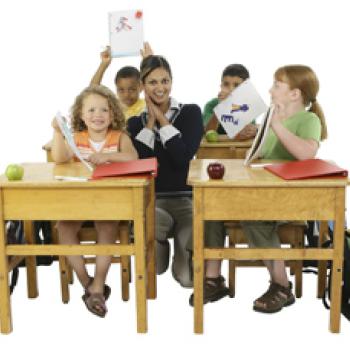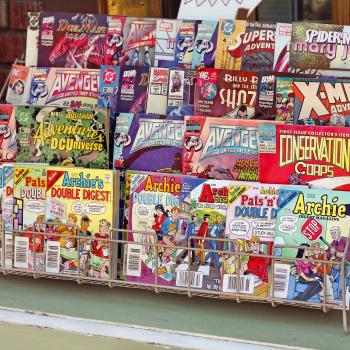In this lesson, students imagine spending a day in someone else's shoes. After reviewing the characteristics of narrative writing, they then write narratives from that person's point of view.

Spend a Day in My Shoes: Exploring the Role of Perspective in Narrative

Grades
|
Building a Matrix for Leo Lionni Books: An Author Study
K - 2
Lesson Plan
| Standard Lesson
In this author study, students listen to and discuss four books by Leo Lionni. They identify similarities and differences in the stories and then compare two stories of their choice.

Grades
|
Every Punctuation Mark Matters: A Minilesson on Semicolons
6 - 8
Lesson Plan
| Minilesson
Students analyze stylistic choices and grammar use in authentic writing, focusing on the use of the semicolon in Martin Luther King Jr.'s "Letter from Birmingham Jail."

Grades
|
Living the Dream: 100 Acts of Kindness
K - 2
Lesson Plan
| Recurring Lesson
This lesson provides the "action piece" for any study of Dr. Martin Luther King, Jr. In this project, students participate in Dr. King's dream by doing 100 acts of kindness.

Grades
|
Exploring the Power of Martin Luther King, Jr.'s Words through Diamante Poetry
9 - 12
Lesson Plan
| Standard Lesson
Students explore the ways that powerful and passionate words communicate the concepts of freedom, justice, discrimination, and the American Dream in Martin Luther King, Jr.'s "I Have a Dream" speech.

Grades
|
Martin Luther King, Jr. and Me: Identifying with a Hero
K - 2
Lesson Plan
| Standard Lesson
This lesson provides ideas for celebrating Martin Luther King, Jr. Day by encouraging students to explore the connections between Dr. King and themselves through journaling and inquiry-based research.

Grades
|
Is a Sentence a Poem?
9 - 12
Lesson Plan
| Minilesson
Students use their own poetry to analyze syntax, imagery, and meaning in a one-sentence poem by a canonical author to decide what makes it a poem.

Grades
|
Book Report Alternative: Creating Careers for Characters
6 - 8
Lesson Plan
| Standard Lesson
Students select a job listing for a character in a book they have read, then create a resume and application letter for that character.

Grades
|
Beyond the Story: A Dickens of a Party
6 - 8
Lesson Plan
| Unit
Students attend a 19th Century Victorian party to celebrate Scrooge's new outlook on life. They research characters from Charles Dickens' A Christmas Carol and assume those personas for the party.

Grades
|
Ghosts and Fear in Language Arts: Exploring the Ways Writers Scare Readers
9 - 12
Lesson Plan
| Standard Lesson
Students analyze scary stories to 'break the code" of horror writing and use what they learn to write scary stories of their own.

Grades
|
Book Report Alternative: Examining Story Elements Using Story Map Comic Strips
3 - 5
Lesson Plan
| Standard Lesson
Comic frames are traditionally used to illustrate a story in a short, concise format. In this lesson, students use a six-paneled comic strip frame to create a story map, summarizing a book or story that they've read. Each panel retells a particular detail or explains a literary element (such as setting or character) from the story.

Grades
|
Webcams in the Classroom: Animal Inquiry and Observation
3 - 5
Lesson Plan
| Recurring Lesson
Students observe animals using one of the many webcams broadcasting from zoos and aquariums around the United States and the world, with a focus on observation, discussion, questioning, and research.

Grades
|
Teaching the Epic through Ghost Stories
9 - 12
Lesson Plan
| Standard Lesson
In this lesson, students connect to the oral tradition of epic storytellers by sharing their own oral tales of ghosts and goblins and monsters.

Grades
|
Playing Name Bingo with Chrysanthemum
K - 2
Lesson Plan
| Standard Lesson
In this twist on traditional bingo, the game boards feature students' names, and students answer questions designed to help them learn more about one another when their names are called.

Grades
|
Comics in the Classroom as an Introduction to Narrative Structure
3 - 5
Lesson Plan
| Standard Lesson
This lesson uses comic strip frames to define plot and reinforce the structure that underlies a narrative. Students finish by writing their own original narratives.

Grades
|
Collaborative Stories 2: Revising
K - 2
Lesson Plan
| Minilesson
Using a collaborative story written by students, the teacher leads a shared-revising activity to help students consider content when revising, with students participating in the marking of text revisions.

Grades
|
Collaborative Stories 1: Prewriting and Drafting
K - 2
Lesson Plan
| Standard Lesson
Students hone their teamwork skills and play off each other's writing strengths as they participate in prewriting activities for a story to be written collaboratively by the whole class.

Grades
|
Style: Translating Stylistic Choices from Hawthorne to Hemingway and Back Again
9 - 12
Lesson Plan
| Standard Lesson
After exploring the styles of two authors, students translate passages from one author into the style of another. They then translate fables into the style of one of the authors.

Grades
|
Style: Defining and Exploring an Author's Stylistic Choices
9 - 12
Lesson Plan
| Standard Lesson
Students find examples of specific stylistic devices in sample literary passages then search for additional examples and explore the reasons for the stylistic choices that the author has made.

Grades
|
Graffiti Wall: Discussing and Responding to Literature Using Graphics
9 - 12
Lesson Plan
| Standard Lesson
Tap students' desires to doodle and draw by having them create a Graffiti Wall, using graphics to discuss a piece of literature that has been read by the whole class.